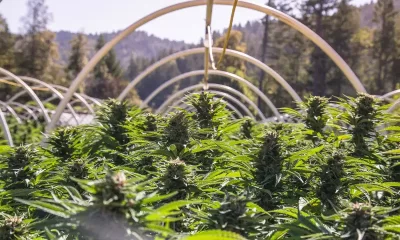Business
Los Angeles County Voters Approve Cannabis Tax

Voters approved Measure C on Tuesday, establishing a tax on cannabis businesses in unincorporated areas.
Los Angeles County voters in California approved Measure C on Tuesday, which will impose a tax structure on businesses in unincorporated areas of the county once they receive permits, Los Angeles Daily News reports.
At the time of writing, nearly 60% of the votes were in favor of Measure C as the final tallies came in.
Measure C imposes several initial tax rates: 4% on gross receipts for retail operations, 3% for manufacturing and distribution, $4 per square foot for mixed light cultivation, and $7 per square foot for indoor cultivation. The Los Angeles County Board of Supervisors may decrease or increase the tax rates within the maximum approved by the voters after July 1, 2026.
It’s important to note that Measure C itself does not legalize cannabis sales in the county, with additional steps before the industry can launch. The Board of Supervisors still needs to vote on that, and they’ve indicated they plan to do so in early 2023.
“All cannabis business activity will remain prohibited in the unincorporated areas of the County until the cannabis business permitting program is launched in 2023,” the bill summary reads. “This measure would make it legal for the County to tax the revenues of cannabis businesses operating in these areas. Once the permitting program launches, a cannabis business operator will need to obtain all the required permits and licenses from the appropriate state and local regulatory agencies including a cannabis business permit issued by the Los Angeles County Office of Cannabis Management.”
The Office of Cannabis Management (OCM) under Los Angeles County’s Department of Consumer and Business Affairs is developing an equitable commercial cannabis program that includes permitting and resources for eligible applicants with a proposed launch in late 2023.
“The approach we’ve adopted will equitably distribute legal cannabis businesses in each supervisorial district and specifies that cannabis cultivation will only be permitted indoors—not outdoors in greenhouses,” Supervisor Kathryn Barger said at a recent board meeting.
“Our board must be clear: we will not tolerate illegal cannabis operations. Growers who operate illegally undermine our efforts to create a regulated and responsible cannabis industry, and often do so at the expense of the rural communities I represent. I’m firmly committed to upholding the law and will corral all available resources to enhance enforcement and abatement efforts.”
County officials estimate a total of $10.4 million in tax revenue that would go to the Los Angeles County General Fund and a cannabis equity program that would provide equitable access for entering the cannabis industry.
For the time being though, cannabis businesses remain prohibited in unincorporated areas of the county until the permitting program launches.
Any existing or newly established cannabis businesses in the unincorporated areas must register with the Los Angeles County Treasurer and Tax Collector within 30 days of commencing operation once the permitting program has launched or within 30 days after the effective date of this ordinance.
Regulations are still being developed, but Los Angeles County staff said the initial plan will likely allow for up to 25 storefront retail cannabis businesses countywide, 25 delivery retail businesses, 10 indoor/mixed light cultivation establishments, 10 manufacturing businesses, 10 distribution facilities, and 10 testing laboratories.
A similar vote also took place nearby in San Diego County.
Voters also decided whether or not to approve Measure A in San Diego County’s unincorporated areas will pay a tax that would generate revenue going toward government services such as health care, fire safety, and parks.
Source: https://hightimes.com/news/los-angeles-county-voters-approve-cannabis-tax/
Business
New Mexico cannabis operator fined, loses license for alleged BioTrack fraud

New Mexico regulators fined a cannabis operator nearly $300,000 and revoked its license after the company allegedly created fake reports in the state’s traceability software.
The New Mexico Cannabis Control Division (CCD) accused marijuana manufacturer and retailer Golden Roots of 11 violations, according to Albuquerque Business First.
Golden Roots operates the The Cannabis Revolution Dispensary.
The majority of the violations are related to the Albuquerque company’s improper use of BioTrack, which has been New Mexico’s track-and-trace vendor since 2015.
The CCD alleges Golden Roots reported marijuana production only two months after it had received its vertically integrated license, according to Albuquerque Business First.
Because cannabis takes longer than two months to be cultivated, the CCD was suspicious of the report.
After inspecting the company’s premises, the CCD alleged Golden Roots reported cultivation, transportation and sales in BioTrack but wasn’t able to provide officers who inspected the site evidence that the operator was cultivating cannabis.
In April, the CCD revoked Golden Roots’ license and issued a $10,000 fine, according to the news outlet.
The company requested a hearing, which the regulator scheduled for Sept. 1.
At the hearing, the CCD testified that the company’s dried-cannabis weights in BioTrack were suspicious because they didn’t seem to accurately reflect how much weight marijuana loses as it dries.
Company employees also poorly accounted for why they were making adjustments in the system of up to 24 pounds of cannabis, making comments such as “bad” or “mistake” in the software, Albuquerque Business First reported.
Golden Roots was fined $298,972.05 – the amount regulators allege the company made selling products that weren’t properly accounted for in BioTrack.
The CCD has been cracking down on cannabis operators accused of selling products procured from out-of-state or not grown legally:
- Regulators alleged in August that Albuquerque dispensary Sawmill Sweet Leaf sold out-of-state products and didn’t have a license for extraction.
- Paradise Exotics Distro lost its license in July after regulators alleged the company sold products made in California.
Golden Roots was the first alleged rulebreaker in New Mexico to be asked to pay a large fine.
Source: https://mjbizdaily.com/new-mexico-cannabis-operator-fined-loses-license-for-alleged-biotrack-fraud/
Business
Marijuana companies suing US attorney general in federal prohibition challenge

Four marijuana companies, including a multistate operator, have filed a lawsuit against U.S. Attorney General Merrick Garland in which they allege the federal MJ prohibition under the Controlled Substances Act is no longer constitutional.
According to the complaint, filed Thursday in U.S. District Court in Massachusetts, retailer Canna Provisions, Treevit delivery service CEO Gyasi Sellers, cultivator Wiseacre Farm and MSO Verano Holdings Corp. are all harmed by “the federal government’s unconstitutional ban on cultivating, manufacturing, distributing, or possessing intrastate marijuana.”
Verano is headquartered in Chicago but has operations in Massachusetts; the other three operators are based in Massachusetts.
The lawsuit seeks a ruling that the “Controlled Substances Act is unconstitutional as applied to the intrastate cultivation, manufacture, possession, and distribution of marijuana pursuant to state law.”
The companies want the case to go before the U.S. Supreme Court.
They hired prominent law firm Boies Schiller Flexner to represent them.
The New York-based firm’s principal is David Boies, whose former clients include Microsoft, former presidential candidate Al Gore and Elizabeth Holmes’ disgraced startup Theranos.
Similar challenges to the federal Controlled Substances Act (CSA) have failed.
One such challenge led to a landmark Supreme Court decision in 2005.
In Gonzalez vs. Raich, the highest court in the United States ruled in a 6-3 decision that the commerce clause of the U.S. Constitution gave Congress the power to outlaw marijuana federally, even though state laws allow the cultivation and sale of cannabis.
In the 18 years since that ruling, 23 states and the District of Columbia have legalized adult-use marijuana and the federal government has allowed a multibillion-dollar cannabis industry to thrive.
Since both Congress and the U.S. Department of Justice, currently headed by Garland, have declined to intervene in state-licensed marijuana markets, the key facts that led to the Supreme Court’s 2005 ruling “no longer apply,” Boies said in a statement Thursday.
“The Supreme Court has since made clear that the federal government lacks the authority to regulate purely intrastate commerce,” Boies said.
“Moreover, the facts on which those precedents are based are no longer true.”
Verano President Darren Weiss said in a statement the company is “prepared to bring this case all the way to the Supreme Court in order to align federal law with how Congress has acted for years.”
While the Biden administration’s push to reschedule marijuana would help solve marijuana operators’ federal tax woes, neither rescheduling nor modest Congressional reforms such as the SAFER Banking Act “solve the fundamental issue,” Weiss added.
“The application of the CSA to lawful state-run cannabis business is an unconstitutional overreach on state sovereignty that has led to decades of harm, failed businesses, lost jobs, and unsafe working conditions.”
Business
Alabama to make another attempt Dec. 1 to award medical cannabis licenses

Alabama regulators are targeting Dec. 1 to award the first batch of medical cannabis business licenses after the agency’s first two attempts were scrapped because of scoring errors and litigation.
The first licenses will be awarded to individual cultivators, delivery providers, processors, dispensaries and state testing labs, according to the Alabama Medical Cannabis Commission (AMCC).
Then, on Dec. 12, the AMCC will award licenses for vertically integrated operations, a designation set primarily for multistate operators.
Licenses are expected to be handed out 28 days after they have been awarded, so MMJ production could begin in early January, according to the Alabama Daily News.
That means MMJ products could be available for patients around early March, an AMCC spokesperson told the media outlet.
Regulators initially awarded 21 business licenses in June, only to void them after applicants alleged inconsistencies with how the applications were scored.
Then, in August, the state awarded 24 different licenses – 19 went to June recipients – only to reverse themselves again and scratch those licenses after spurned applicants filed lawsuits.
A state judge dismissed a lawsuit filed by Chicago-based MSO Verano Holdings Corp., but another lawsuit is pending.
Source: https://mjbizdaily.com/alabama-plans-to-award-medical-cannabis-licenses-dec-1/
-

 Business2 years ago
Business2 years agoPot Odor Does Not Justify Probable Cause for Vehicle Searches, Minnesota Court Affirms
-

 Business2 years ago
Business2 years agoNew Mexico cannabis operator fined, loses license for alleged BioTrack fraud
-

 Business2 years ago
Business2 years agoAlabama to make another attempt Dec. 1 to award medical cannabis licenses
-

 Business2 years ago
Business2 years agoWashington State Pays Out $9.4 Million in Refunds Relating to Drug Convictions
-

 Business2 years ago
Business2 years agoMarijuana companies suing US attorney general in federal prohibition challenge
-

 Business2 years ago
Business2 years agoLegal Marijuana Handed A Nothing Burger From NY State
-

 Business2 years ago
Business2 years agoCan Cannabis Help Seasonal Depression
-

 Blogs2 years ago
Blogs2 years agoCannabis Art Is Flourishing On Etsy













